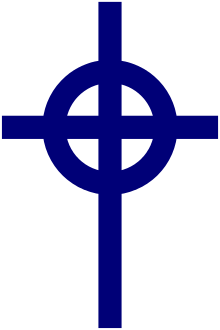Irish Catholics
Irish Catholics are an ethnoreligious group native to Ireland[12][13] that are both Catholic and Irish. Irish Catholics have a large diaspora, which includes more than 10 million Americans.[14]
 | |
| Total population | |
|---|---|
| 4.6 million (Ireland) Unknown number of Catholics of full or partial Irish descent worldwide (notably in Canada and the Eastern and Central United States) | |
| Regions with significant populations | |
| 3,861,335 | |
| Northern Ireland | 738,033 |
| ~12,000,000[1][2] | |
| 4,544,870[3] | |
| 6,000,000-14,000,000 (25% more or 25% less ancestry)[4] | |
| 2,000,000-7,000,000 (partial of self-declared)[5][6] | |
| 500,000-1,000,000[7][8] | |
| 600,000[9] | |
| 600,000[10] | |
| 15,000[11] | |
| Languages | |
| English (Irish, American, British, Australian and New Zealander), Irish (primarily Ireland), Spanish (Argentine and Mexican) and French (Metropolitan French) | |
| Religion | |
| Catholic Christianity | |
| Related ethnic groups | |
| Irish people, Irish diaspora, Irish Travellers, Irish Americans, Irish Canadians, Irish Australians, Irish New Zealanders, Irish Britons, Irish Argentines, Irish Mexicans, Irish French | |
Overview and history
Divisions between Irish Catholics and Irish Protestants played a major role in the history of Ireland from the 16th to the 20th century, especially the Home Rule Crisis and the Troubles. While religion broadly marks the delineation of these divisions, the contentions were primarily political and related to access to power. For example, while the majority of Irish Catholics saw themselves as having an identity independent of Britain and were excluded from power, a number of the instigators in rebellions against British rule were in fact Protestant Irish nationalists, although most Irish Protestants opposed separatism. In the Irish Rebellion of 1798 Catholics and Presbyterians, who were not part of the established Church of Ireland, found common cause.
Irish Catholics are found in many countries around the world, especially the Anglosphere. Emigration increased exponentially due to the Great Famine in the mid 1800s. In the United States, hostility and violence towards Irish Catholics was expressed by the Know Nothing movement of the 1850s and other 19th century anti-Catholic, anti-Irish groups. By the 20th century, Irish Catholics were well established in the United States and are now part of mainstream American society.
See also
- Catholic Church in Ireland
- Celtic Christianity
- Cultural Catholic
- Irish migration to Britain
- Irish Newfoundlanders
- Irish Quebecers
- Irish-Scots
- Penal Laws
- Saint Patrick's Day
- Ulster-Scots people
References
- "Selected Social Characteristics in the United States (DP02): 2013 American Community Survey 1-Year Estimates". U.S. Census Bureau. Archived from the original on February 12, 2020. Retrieved December 11, 2014.
- Carroll, Michael P. (Winter 2006). "How the Irish Became Protestant in America". Religion and American Culture. University of California Press. 16 (1): 25–54. JSTOR 10.1525/rac.2006.16.1.25.
Of the 1,495 respondents who identified themselves as "Irish," 51 percent were Protestant and 36 percent were Catholic.
- "Ethnic Origin (264), Single and Multiple Ethnic Origin Responses (3), Generation Status (4), Age Groups (10) and Sex (3) for the Population in Private Households of Canada, Provinces, Territories, Census Metropolitan Areas and Census Agglomerations, 2011 National Household Survey". Statistics Canada. 2011.
- "One in four Britons claim Irish roots". News.bbc.co.uk. March 16, 2001.
- "Ancestry Information Operations Unlimited Company - Press Release". www.ancestryeurope.lu. Archived from the original on September 7, 2017. Retrieved October 11, 2017.
- "Ireland country brief" Check
|url=value (help). Department of Foreign Affairs and Trade. July 28, 2013. Retrieved June 2, 2019. - "Western People: Flying the Irish flag in Argentina". Western People. March 14, 2007. Archived from the original on December 18, 2007. Retrieved June 2, 2019.
- "IrishAboard.com = Irish Social Networking Worldwide". www.irishaboard.com.
- "The Irish in New Zealand: Historical Contexts and Perspectives - Brian Easton". www.eastonbh.
- "LOS IRLANDERS-MEXICANOS: The Irish in Mexico". thewildgeese.irish.
- "Prếsentation de l'Irlande". France Diplomatie : : Ministḕre de l'Europe des Affaires ễtrangễres.
- Evans, Jocelyn; Tonge, Jonathan (2013). "Catholic, Irish and Nationalist: evaluating the importance of ethno-national and ethno-religious variables in determining nationalist political allegiance in Northern Ireland". Nations and Nationalism. 19 (2): 357–375. doi:10.1111/nana.12005.
- http://umanitoba.ca/colleges/st_pauls/ccha/Back%20Issues/CCHA1983-84/Nicolson.pdf
- "U.S. Census". U.S. Census Bureau. Archived from the original on 11 February 2020. Retrieved 13 April 2008.
- ISBN 0-8132-0896-3
- ISBN 978-0-8132-0896-1
Further reading
- The Irish Cultural, Political, Social, and Religious Heritages
- Ireland: The Rise of Irish Nationalism, 1801–1850
- Emigrants and Immigrants
- Communities in Conflict: American Nativists and Irish Catholics
- Irish-American Politics
- Irish America and the Course of Irish Nationalism
- From Ghetto to Suburbs: From Someplace to Noplace?
- Endnotes
External links
- Library of Congress
- The Irish Catholic Diaspora in America, describes the book ISBN 0-8132-0896-3
- St. Colman Mac Duagh (Popular Irish Catholic site)
- On Irish Catholics of Australia